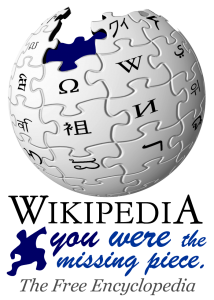The Awl, that fascinating stream of information and ideas, has a particularly wonderful article-length post in “Wikipedia and the Death of the Expert,” which was written by Maria Bustillos. It was just a few short years ago that Jimmy Wales’ brainchild was being openly mocked. People were too focused on what Wikipedia wasn’t (a flawless source), ignoring what it was (an excellent starting point for a curious mind, one of the great triumphs of crowdsourcing and an apotheosis of amateurism). But the laughter has stopped. Wikipedia hasn’t contributed to the decline of civilization but to the storehouse of knowledge, widening it with a lack of disdain toward so-called “low culture.” The original idea for Wikipedia didn’t come from crowdsourcing, but it would still be an empty room without the crowd that occupied it.
The opening of Bustillos’ Awl post:
“It’s high time people stopped kvetching about Wikipedia, which has long been the best encyclopedia available in English, and started figuring out what it portends instead. For one thing, Wikipedia is forcing us to confront the paradox inherent in the idea of learners as ‘doers, not recipients.’ If learners are indeed doers and not recipients, from whom are they learning? From one another, it appears; same as it ever was.
It’s been over five years since the landmark study in Nature that showed ‘few differences in accuracy’ between Wikipedia and theEncyclopedia Britannica. Though the honchos at Britannica threw a big hissy at the surprising results of that study, Nature stood by its methods and results, and a number of subsequent studies have confirmed its findings; so far as general accuracy of content is concerned, Wikipedia is comparable to conventionally compiled encyclopedias, including Britannica.”
••••••••••
Jimmy Wales describes the birth of Wikipedia at TED in 2005:
The conclusion of Stacy Schiff’s 2006 New Yorker article, “Know It All,” which realized that the Wiki mob was winning but wasn’t sure if the victory was Pyrrhic: “In the nineteen-sixties, William F. Buckley, Jr., said that he would sooner ‘live in a society governed by the first two thousand names in the Boston telephone directory than in a society governed by the two thousand faculty members of Harvard University.’ On Wikipedia, he might finally have his wish. How was his page? Essentially on target, he said. All the same, Buckley added, he would prefer that those anonymous two thousand souls govern, and leave the encyclopedia writing to the experts.
Over breakfast in early May, I asked Cauz for an analogy with which to compare Britannica and Wikipedia. ‘Wikipedia is to Britannica as ‘American Idol’ is to the Juilliard School,’ he e-mailed me the next day. A few days later, Wales also chose a musical metaphor. ‘Wikipedia is to Britannica as rock and roll is to easy listening,’ he suggested. “It may not be as smooth, but it scares the parents and is a lot smarter in the end.’ He is right to emphasize the fright factor over accuracy. As was the Encyclopédie, Wikipedia is a combination of manifesto and reference work. Peer review, the mainstream media, and government agencies have landed us in a ditch. Not only are we impatient with the authorities but we are in a mood to talk back. Wikipedia offers endless opportunities for self-expression. It is the love child of reading groups and chat rooms, a second home for anyone who has written an Amazon review. This is not the first time that encyclopedia-makers have snatched control from an élite, or cast a harsh light on certitude. Jimmy Wales may or may not be the new Henry Ford, yet he has sent us tooling down the interstate, with but a squint back at the railroad. We’re on the open road now, without conductors and timetables. We’re free to chart our own course, also free to get gloriously, recklessly lost. Your truth or mine?”
Tags: Maria Bustillos, Stacy Schiff

